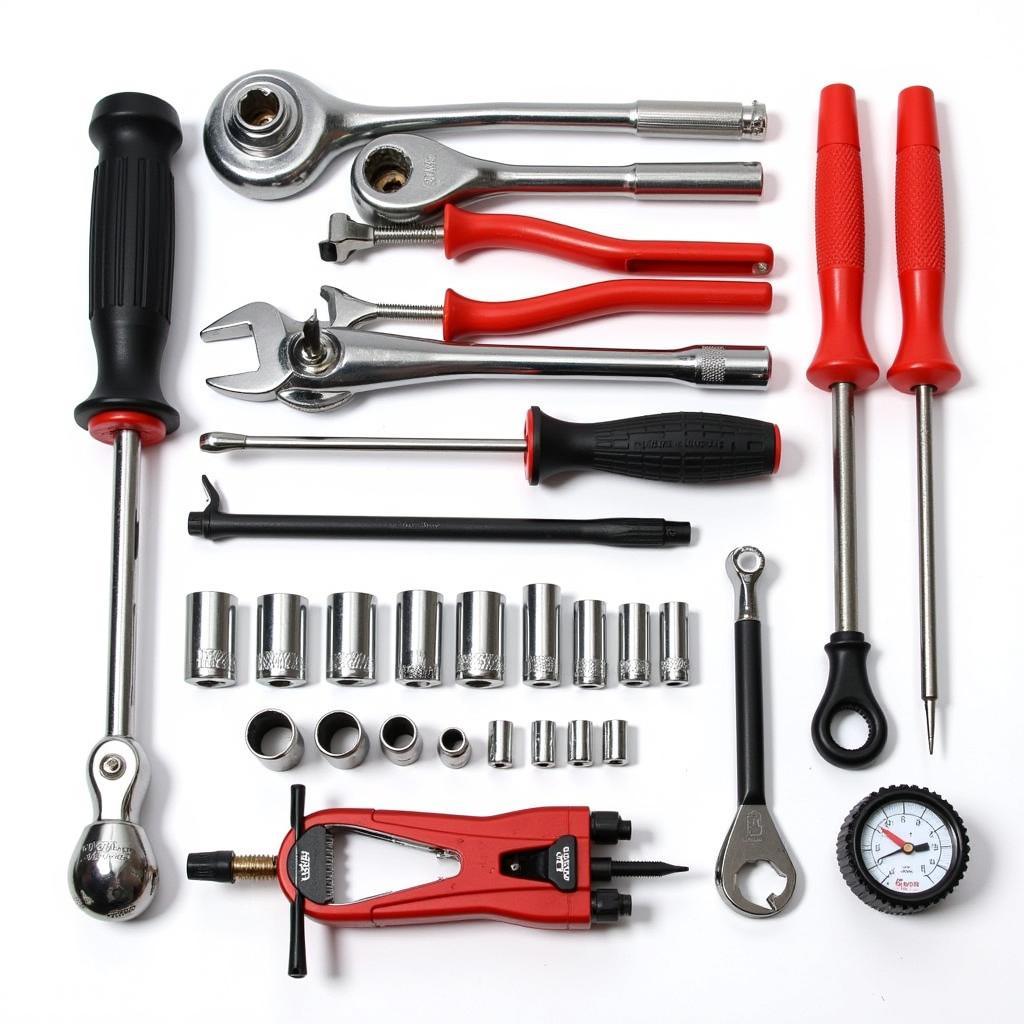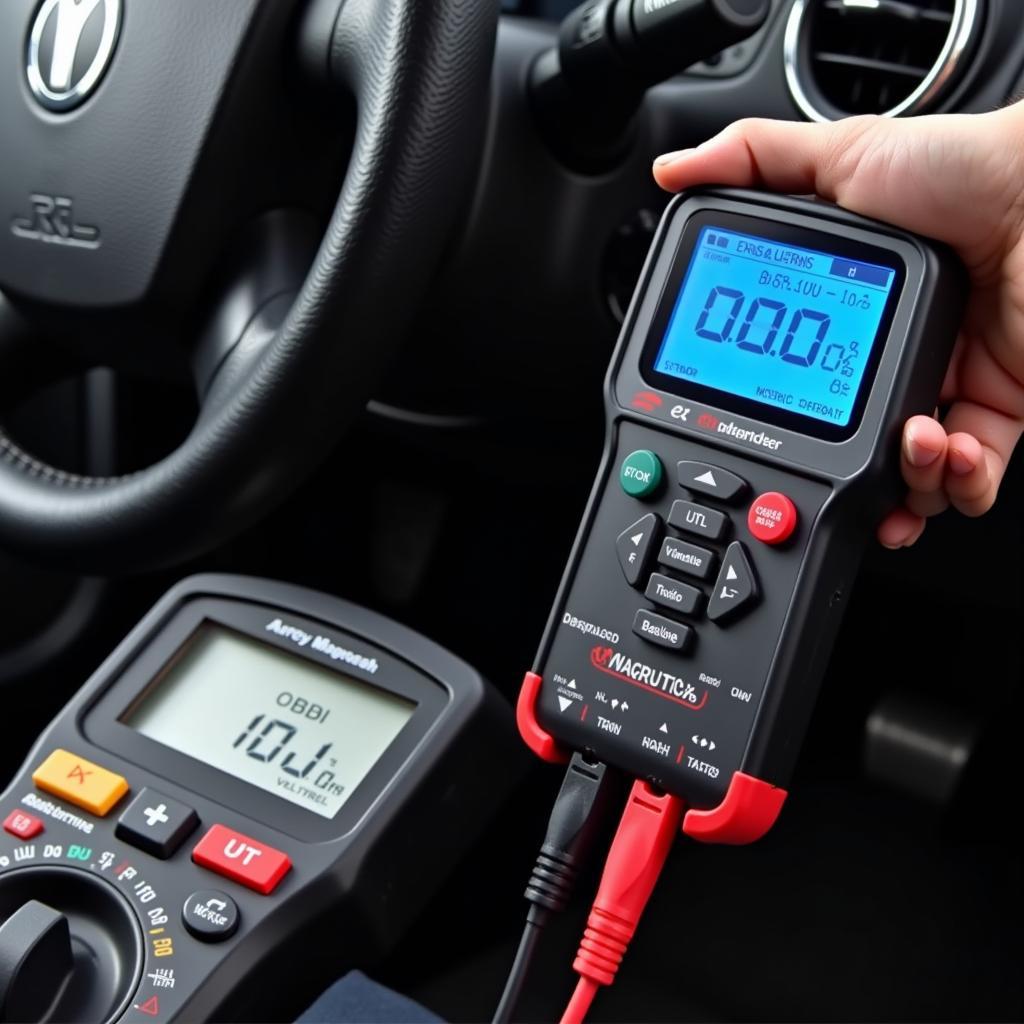Knowing what tools you need to fix a car can be the difference between a quick roadside repair and a costly tow. This article will equip you with the knowledge to tackle common car problems, from simple maintenance to more complex repairs, by outlining the essential tools every car owner and aspiring mechanic should have.
Basic Tools for Every Car Owner
Every car owner should have a basic set of tools for minor repairs and routine maintenance. These tools will save you money and empower you to handle unexpected situations.
- Screwdrivers: A set of both Phillips and flathead screwdrivers in various sizes is crucial for tasks like changing a battery, replacing a lightbulb, or tightening loose screws.
- Wrenches: A combination wrench set, including both metric and standard sizes, is essential for removing and installing nuts and bolts.
- Pliers: Needle-nose pliers, slip-joint pliers, and locking pliers (also known as Vise-Grips) are invaluable for gripping, bending, and cutting wires, as well as removing stubborn fasteners.
- Socket Set: A socket set with a ratchet and extensions allows you to access hard-to-reach bolts and nuts with greater leverage and efficiency. Make sure to get both metric and standard sizes.
- Jack and Jack Stands: These are essential for lifting your car safely to change a tire or perform undercarriage work. Never work under a car supported only by a jack.
- Lug Wrench: Used specifically for removing lug nuts when changing a tire. Most cars come with one, but having a dedicated, high-quality lug wrench can make the process much easier.
- Tire Pressure Gauge: Regularly checking tire pressure is essential for safety and fuel efficiency.
 Essential Car Tools for Beginners
Essential Car Tools for Beginners
Diagnostic Tools: Understanding What’s Wrong
Modern cars are increasingly complex, and understanding what’s wrong often requires specialized diagnostic tools.
- OBD-II Scanner: An OBD-II (On-Board Diagnostics) scanner plugs into your car’s diagnostic port and reads trouble codes, providing valuable insights into the source of a problem. Some advanced scanners can even perform bi-directional communication with the car’s systems.
- Multimeter: A multimeter measures voltage, current, and resistance, allowing you to troubleshoot electrical issues and test components like sensors and fuses.
 Essential Diagnostic Tools for Car Repair
Essential Diagnostic Tools for Car Repair
Advanced Tools for the DIY Mechanic
If you’re tackling more complex repairs, you’ll need a more extensive set of tools.
- Torque Wrench: A torque wrench allows you to tighten bolts to a specific torque specification, which is critical for ensuring proper assembly and preventing damage to components.
- Impact Wrench: An impact wrench provides high-torque output for removing stubborn fasteners, particularly useful for rusted or seized bolts.
- Breaker Bar: Provides extra leverage for loosening extremely tight bolts.
- Code Reader: If you’re looking to enhance your diagnostic capabilities, consider a dedicated code reader. Check out some suggestions in our article on the best emergency tool for car.
“A quality torque wrench is a must-have for any serious DIY mechanic,” says automotive expert, Michael Stevenson. “Over-tightening bolts can lead to stripped threads and damaged components, while under-tightening can cause parts to loosen and fail.”
Specialized Tools for Specific Tasks
Certain repairs require specialized tools. Here are a few examples:
- Suspension work often requires specialized tools like spring compressors. For information on tools used in suspension removal, see our article on a smart car suspension removal tool.
- Body work may necessitate tools like dent pullers and panel beaters.
- Paint removal requires specific tools like sanders and chemical strippers. For more information on this, see our guide on the best tool to remove paint from car.
Choosing the Right Tools
When choosing tools, consider quality, durability, and brand reputation. Investing in good tools will save you money in the long run.
“Don’t skimp on quality when it comes to your tools,” advises Sarah Miller, a seasoned mechanic with over 20 years of experience. “A cheap tool can break easily, potentially causing injury or further damage to your car.” Also, consider exploring different career path tool options if you’re passionate about cars.
Conclusion
Having the right tools is essential for anyone who wants to work on their car. From basic maintenance to complex repairs, what tools you need to fix a car depends on the job at hand. By investing in quality tools and understanding their proper use, you can save money, gain valuable skills, and enjoy the satisfaction of fixing your own car.
FAQ
- What is the most important tool for a beginner? A good set of screwdrivers and wrenches is a great starting point.
- Do I need metric or standard tools? Most modern cars use metric fasteners, but it’s helpful to have both.
- Where can I buy car tools? Automotive parts stores, online retailers, and hardware stores all sell car tools.
- How do I learn to use these tools? There are numerous online resources, including videos and tutorials, that can teach you how to use car tools.
- What safety precautions should I take when working on my car? Always work in a well-ventilated area, wear safety glasses, and never work under a car supported only by a jack.
For further information regarding tools and forms for long-term care of your vehicle, visit our page on clinical tools and forms for long-term care. We also recommend exploring our other articles covering a wider range of car repair topics.
Need assistance? Contact us via WhatsApp: +1(641)206-8880, Email: [email protected] or visit us at 910 Cedar Lane, Chicago, IL 60605, USA. Our customer support team is available 24/7.

Leave a Reply